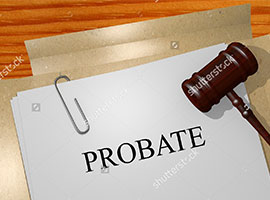Probate Assistance
 How to probate and estate without lawyers and save money — call now for low prices!
How to probate and estate without lawyers and save money — call now for low prices!
PROBATE is the court supervised distribution of your assets if you don’t have a living trust and can be a long, expensive process that simply does not have to occur. The expense of this process as compared to the expense of administering a living trust should be calculated to decide whether, in your case, creation of a living trust is a better solution.
Death is a difficult time for everyone concerned, and you may want to protect your family from having to go to probate court, if there is a better solution in your case.
The probate process usually involves…
- Filing a deceased person’s will with the local probate court
- Taking an inventory/getting appraisals
- Publishing notices
- Paying all legal debts
- Distributing the remaining assets and property to the rightful heirs
Probate may require an “executor” and an “attorney.” Sometimes the executor is referred to as the “personal representative.” The executor is responsible for making sure the Last Will and Testament is followed. The executor often hires an attorney to handle the necessary paperwork.
Executors and attorneys are allowed to charge “reasonable fees” for their services. Executors who are family members frequently waive their own fees where the estate is small, but they are not obliged to do so. Some additional fees beyond those paid to the attorney and executor include court costs, filing fees, etc. These fees are paid out before any proceeds are distributed to the decedent’s family.
Our services include the preparation and filing of your court documents and scheduling of the required hearings without the need to hire a lawyer.
Our fees are a fraction of what the attorney’s charge for a Probate proceeding. Please call for a quote!
How Probate Administration works
Show More
An estate can be administered without a probate administration proceeding, depending on how title is held on the decedent’s assets and the value of the estate. In the event that a probate administration is necessary, below is a summary of the some of the steps involved in a probate proceeding.
Probate administration is form-intensive and is governed by numerous rules and provisions found in the California Probate Code, California Rules of Court, local rules written by each county, and by Judicial Council-approved forms.
A probate proceeding begins with filing a petition. If a will exists, then typically the named executor files the petition for probate of the will. If no will exists, then an interested party may file the petition for letters of administration. Where the petition gets filed, depends on the domiciliary of the decedent. If the decedent was domiciled in California, the petition is filed in the county where the decedent was domiciled at the time of death, regardless of the place of death.
A hearing date is then set by the court clerk at the time the petition is filed and notice must be properly served on all interested parties and published prior to the hearing date. If no objections are made at the time of the hearing and all necessary documentation and information has been received by the court, a personal representative will be appointed.
The personal representative then must find, secure, and manage the estate’s assets. The assets will be itemized for the court and valued by the personal representative and/or a court-appointed probate referee. Notice of the administration of the estate must be given to the Franchise Tax Board, other governmental agencies, and all potential creditors. They then have four months to submit a claim for payment of any debts owed.
Depending on the contents of the estate, and the amount of the debts, the personal representative may have to decide whether or not to sell any real property, securities, or other assets. For example, if there is a will that makes a number of cash bequests but the estate consists mostly of valuable artwork, the collection might have to be sold to produce cash. Another example is if the estate has more outstanding debts than there are liquid assets, it might be necessary for the personal representative to sell some of the property to pay them.
Once all debts and taxes have been paid and the time for filing a creditor’s claim has expired, the personal representative can petition the court to approve all reported acts, allow compensation for statutory attorney and personal representative’s fees, and order the estate to be distributed to the rightful beneficiaries and the estate be closed. It may be necessary for the personal representative to prepare an accounting wherein all monies received and all monies paid out of the estate are documented and the estate’s account is balanced. If an accounting is necessary, it is submitted and filed with the court at the time the petition to close the estate is filed.
Once the court has granted the plan for distribution, the assets then get distributed to the new owners and the estate can be closed.
show less
FOR MORE INFORMATION OR TO ANSWER YOUR QUESTIONS, PLEASE FILL OUT THE FORM BELOW
AFFORDABLE LEGAL DOCUMENT PREPARATION
TEAM Legal Document Services is a registered Legal Document Assistant. We are not a law office. We offer self help legal document preparation services. We do not give legal advice. We offer computerized legal document preparation services for a wide variety of needs.
For over 25 years we have been dedicated to providing accurate document preparation services at a low cost with excellent customer service. We continue to assist our customers with WILLS, LIVING TRUSTS, INCORPORATIONS, PARTNERSHIPS, DIVORCES, CUSTODY ORDERS, NAME CHANGES. There are over 50 different areas of assistance that we can help you with at a fraction of the cost of an attorney.
Submit your questions and we will respond as quickly as we can. Your personal information will remain private.
